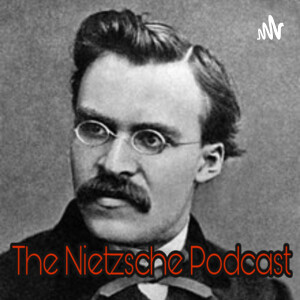
We've considered two out of the three main strands of 20th century political thought: capitalism and socialism. Fascism is the third, and it is both the most and the least important of the three to consider. I consider it the least important because fascism was defeated, and relegated to the fringes, and honoring its existence with a critique seems like a waste of time. On the other hand, when it comes to Nietzsche, it becomes particularly important to address because of how Nietzsche was tarred with the associations with the fascists, and blamed for their crimes. In this episode, we explore the reasons for this, including his sister Elisabeth, Nietzsche's association with Wagner, Nazi philosophers like Baumler who tried to reshape Nietzsche's ideas to his fit own, and critics like Ernest Newman who took the Nazi claims on Nietzsche uncritically. In fact, when we look to Nietzsche's letters, and many statements he'd made over the years about his break with Wagner, that the ideas of German nationalism and anti-semitism were repugnant to him - he goes so far as to say that it is opposed to his entire way of life. As such, we take a particular focus in this episode on addressing anti-semitism. Even though anti-semitism is not essential to all forms of fascism, the same patterns of harnessing the envy and resentment of the average, precarious person and giving him an evil enemy to fight can be seen in its example. We find that Nietzsche's philosophy is opposed to any essential idea of race, and that those who believed in such things often appealed to mystical or metaphysical claims about the races as descended from pure, separate species from an ancient Golden Age - such as the occult beliefs of the Thule Society. And finally, even against Mussolinian ideas of state-worship, Nietzsche exists in stark contrast, as we call to mind his concern of the state becoming the ends rather than a means, and the "iron-clamp" crushing down and stopping all productions of culture. For Nietzsche, the state is "the coldest of all monsters", and it is a lie when it claims to represent or stand for the people. This episode is unique among these three excursions into 20th century political thought in that it is the only one of the three where we'll seriously examine Nietzsche's life, yet again, and his personal relationships, since none of this can be understood without the story of Elisabeth Nietzsche.
As sources, I've used Umberto Eco's Ur-Fascism essay in order to ground what we're talking about as regards fascism, and we'll look at some ways in which Nietzsche and he agree in condemning fascism, but some ways in which Nietzsche's ideas run astray of Eco's standards.
I've also used Stephen Hicks' book, "Nietzsche and the Nazis", and some of the materials available on his website. We look at five ways that Hicks sees Nietzsche as opposed to the Nazis, and five ways they could be seen as similar. I disagree with Hicks on many points, though I feel his work to be valuable.
I also cite Kaufmann's biography of Nietzsche at many points (albeit without providing page numbers), and even use Rob Solomon's introduction to Nietzsche, "What Nietzsche Really Said", for one quote.
view more
More Episodes
The Gay Science #7 (II.76-II.83)
 2024-11-07
2024-11-07
 2024-11-07
2024-11-07
105: Arthur Machen - The Great God Pan
 2024-10-29
2024-10-29
 2024-10-29
2024-10-29
The Gay Science #6 (II.57-75)
 2024-10-22
2024-10-22
 2024-10-22
2024-10-22
104: Donna Tartt - The Secret History
 2024-10-08
2024-10-08
 2024-10-08
2024-10-08
103: Euripedes - The Bacchae
 2024-10-01
2024-10-01
 2024-10-01
2024-10-01
101: Aeschylus - The Oresteia
 2024-09-17
2024-09-17
 2024-09-17
2024-09-17
100: Peter Sloterdijk - Nietzsche Apostle
 2024-09-10
2024-09-10
 2024-09-10
2024-09-10
99: Carl Jung - The Undiscovered Self
 2024-09-03
2024-09-03
 2024-09-03
2024-09-03
98: Yukio Mishima - Sun & Steel
 2024-08-27
2024-08-27
 2024-08-27
2024-08-27
The Gay Science #5 (I.45 - I.56)
 2024-08-06
2024-08-06
 2024-08-06
2024-08-06
The Gay Science #4 (I.30 -I.44)
 2024-07-30
2024-07-30
 2024-07-30
2024-07-30
The Gay Science #3 (I.21 - I.29)
 2024-07-23
2024-07-23
 2024-07-23
2024-07-23
The Gay Science #2 (I.10 - I.20)
 2024-07-16
2024-07-16
 2024-07-16
2024-07-16
The Gay Science #1 (Preface, I.1 - I.9)
 2024-07-09
2024-07-09
 2024-07-09
2024-07-09
Q&A #10
 2024-07-02
2024-07-02
 2024-07-02
2024-07-02
Wandering Above A Sea of Fog #3
 2024-06-18
2024-06-18
 2024-06-18
2024-06-18
96: Nietzsche as Educator
 2024-06-11
2024-06-11
 2024-06-11
2024-06-11
012345678910111213141516171819
Create your
podcast in
minutes
- Full-featured podcast site
- Unlimited storage and bandwidth
- Comprehensive podcast stats
- Distribute to Apple Podcasts, Spotify, and more
- Make money with your podcast
It is Free
- Privacy Policy
- Cookie Policy
- Terms of Use
- Consent Preferences
- Copyright © 2015-2024 Podbean.com






